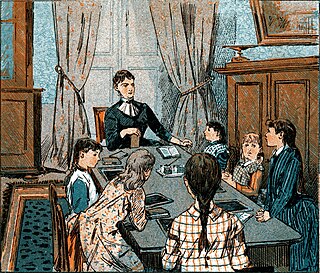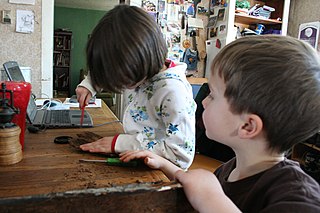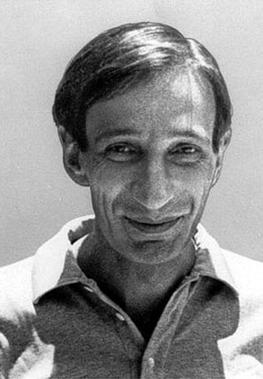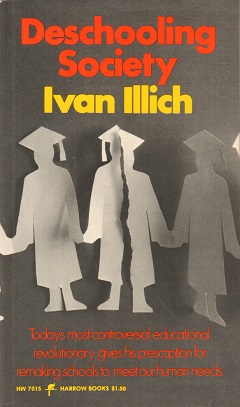Related Research Articles

Homeschooling or home schooling, also known as home education or elective home education (EHE), is the education of school-aged children at home or a variety of places other than a school. Usually conducted by a parent, tutor, or online teacher, many homeschool families use less formal, more personalized and individualized methods of learning that are not always found in schools. The actual practice of homeschooling varies considerably. The spectrum ranges from highly structured forms based on traditional school lessons to more open, free forms such as unschooling, which is a lesson- and curriculum-free implementation of homeschooling. Some families who initially attended a school go through a deschool phase to break away from school habits and prepare for homeschooling. While "homeschooling" is the term commonly used in North America, "home education" is primarily used in Europe and many Commonwealth countries. Homeschooling should not be confused with distance education, which generally refers to the arrangement where the student is educated by and conforms to the requirements of an online school, rather than being educated independently and unrestrictedly by their parents or by themselves.

Unschooling is an informal learning method that prioritizes learner-chosen activities as a primary means for learning. Unschoolers learn through their natural life experiences including play, household responsibilities, personal interests and curiosity, internships and work experience, travel, books, elective classes, family, mentors, and social interaction. Often considered a lesson- and curriculum-free implementation of homeschooling, unschooling encourages exploration of activities initiated by the children themselves, under the belief that the more personal learning is, the more meaningful, well-understood, and therefore useful it is to the child. While unschooled students may occasionally take courses, unschooling questions the usefulness of standard curricula, fixed times at which learning should take place, conventional grading methods and standardized tests, forced contact with children in their own age group, the compulsion to do homework regardless of whether it helps the learner in their individual situation, the effectiveness of listening to and obeying the orders of one authority figure for several hours each day, and other features of traditional schooling.

John Caldwell Holt was an American author and educator, a proponent of homeschooling, and a pioneer in youth rights theory.

Ivan Dominic Illich was an Austrian Roman Catholic priest, theologian, philosopher, and social critic. His 1971 book Deschooling Society criticises modern society's institutional approach to education, an approach that constrains learning to narrow situations in a fairly short period of the human lifespan. His 1975 book Medical Nemesis, importing to the sociology of medicine the concept of medical harm, argues that industrialised society widely impairs quality of life by overmedicalising life, pathologizing normal conditions, creating false dependency, and limiting other more healthful solutions. Illich called himself "an errant pilgrim."
Alternative education encompasses many pedagogical approaches differing from mainstream pedagogy. Such alternative learning environments may be found within state, charter, and independent schools as well as home-based learning environments. Many educational alternatives emphasize small class sizes, close relationships between students and teachers and a sense of community.

John Taylor Gatto was an American author and school teacher. After teaching for nearly 30 years he authored several books on modern education, criticizing its ideology, history, and consequences. He is best known for his books Dumbing Us Down: the Hidden Curriculum of Compulsory Schooling, and The Underground History of American Education: A Schoolteacher’s Intimate Investigation Into the Problem of Modern Schooling.
Growing Without Schooling (GWS) was a homeschooling newsletter focused primarily on unschooling and deschooling. It was founded in 1977 by educator John Holt, and was published in Boston, Massachusetts. Reportedly the first such publication in the United States, it was read worldwide, and helped to catalyze the early growth and development of the homeschooling movement. Publication ceased in 2001 after 143 issues.
Anti-schooling activism, or radical education reform, describes positions that are critical of school as a learning institution and/or compulsory schooling laws; or multiple attempts and approaches to fundamentally change the school system. People of this movement usually advocate alternatives to the traditional school system, education independent from school, the absence of the concept of schooling as a whole, or the right that people can choose how, where and with whom they are educated.

Homeschooling constitutes the education of about 3.4% of U.S. students as of 2012. The number of homeschoolers in the United States has increased significantly over the past few decades since the end of the 20th century. In the United States, the Supreme Court has ruled that parents have a fundamental right to direct the education of their children. The right to homeschool is not frequently questioned in court, but the amount of state regulation and help that can or should be expected continues to be subject to legal debate.
Patrick Farenga is an American writer and educational activist. He is known as a leading advocate of the modern homeschooling movement which started in the 1970s.
Holistic education is a movement in education that seeks to engage all aspects of the learner, including mind, body, and spirit. Its philosophy, which is also identified as holistic learning theory, is based on the premise that each person finds identity, meaning, and purpose in life through connections to their local community, to the natural world, and to humanitarian values such as compassion and peace.
Education Otherwise (EO) is a registered charity based in England, which aims to provide support and information for families whose children are being educated outside school. Education Otherwise is the foremost Charity across England and Wales that promotes and supports the right of a parent or guardian to home educate their child should they wish to do so. EO is in fact the largest home education charity in the United Kingdom. The organisation derived its name from section 36 of the Education Act 1944, which stated that parents are responsible for the education of their children, "either by regular attendance at school or otherwise." This clause has been retained in subsequent Education Acts, and remains a clear acceptance of the parity and validity afforded an education otherwise than by schooling.
Single-parent homeschooling is the practice of conducting homeschool by a parent who may be the sole breadwinner for the family. According to the peer-review journal Education Policy Analysis, based on the findings of the National Household Education Survey, of the National Center of Educational Statistics, between 1994 and 1999 the number of single-parent homeschools almost doubled. No further statistics are currently available. It is the general perception, by most homeschooling advocates, that most single-parent homeschools are led by a self-employed single parent, one that is receiving public assistance, or someone that has received a life insurance settlement. In some single-parent homeschool circles it is thought that most-single parent homeschools are run by parents who work full-time jobs outside the home. No statistics have been compiled to confirm or invalidate either supposition.

Deschooling Society is a 1971 book written by Austrian priest Ivan Illich that critiques the role and practice of education in the modern world.

Homeschooling is illegal in many countries. Countries with the most prevalent homeschooling movements include Australia, Canada, New Zealand, the United Kingdom, and the United States. Some countries have highly regulated homeschooling programs as an extension of the compulsory school system; few others, such as Germany, have outlawed it entirely. In some other countries, while not restricted by law, homeschooling is not socially acceptable, or is considered undesirable, and is virtually non-existent.
Anarchism has had a special interest on the issue of education from the works of William Godwin and Max Stirner onwards.
Susannah Sheffer is an author, editor, and activist, focusing on issues of education, prisons, and the death penalty. She is a leader in the unschooling, deschooling, and homeschooling movement. She served on the board of Holt Associates, edited the newsletter Growing Without Schooling (GWS) for many years, and edited the book A Life Worth Living: Selected Letters of John Holt. She is currently a staff member of North Star, an alternative to middle school and high school in Massachusetts.
In Canada, homeschooling has increased in popularity since the advent of the 21st century. It is legal in every province, with each province having its own regulations around the practice. In some provinces, funding is available. In 2016, the number of homeschooled children in Canada was approximately 60,000 ; this corresponds to approximately one in every 127 school-aged children. In 2020, the average growth rate of the practice amounted to more than 5 per cent per year. Canada has a large proportion of non-religiously motivated homeschoolers compared to some other countries. It is also one of three countries worldwide, along with the United States and South Africa, that hosts an organization with lawyers on staff which serves the legal needs of home educators.
In Australia, homeschooling is becoming increasingly popular. It is legal in all Australian states and territories, with each having its own regulations around the practice. Distance education is also prevalent for Australians who live in remote, rural areas. There are more than a dozen universities in Australia that support distance education for tertiary studies. Some Australians switch between distance education and classroom teaching. The number of homeschooled children and students who take distance education in Australia is approximately 30,000. The number of registered homeschoolers alone was 21,437 in 2019; this corresponds to 0.5 per cent of the total school population of Australia. In the 2010s, the average growth rate of the practice amounted to 9.4 per cent per year. The largest Christian school of distance education in Australia is the Australian Christian College, which has over 1,700 families with 4,000 students enrolled. Homeschooling generally enjoys a very good reputation in the Australian media and is widely seen as a flexible alternative form of education with good socialization opportunities in the community.
Time4Learning is an American homeschooling curriculum provider. It is based in Dallas, Texas. Cheryl Dodge is the incumbent president of the organization.
References
- ↑ "Learn The Difference Between Unschooling and Deschooling". Time4Learning. Retrieved 2020-11-29.
- 1 2 "From School to Homeschool: What is Deschooling?". TheHomeSchoolMom. 2014-02-25. Retrieved 2020-12-01.
- ↑ "Deschooling: Starting Out Right at Home". TheHomeSchoolMom. Retrieved 2020-11-29.
- ↑ "What is Deschooling?". Observatory of Educational Innovation. Retrieved 2020-11-29.
- 1 2 "What, When, Why & How of Deschooling". Time4Learning. Retrieved 2020-11-29.
- 1 2 3 Buehler, Antonio (2017-05-31). "Deschooling: How Long Does it Take?". Abrome. Retrieved 2020-11-29.
- ↑ MaryEllen (2012-08-31). "Deschooling: Important Homeschooling Step Or Useless Buzzword?". Off The Grid News. Retrieved 2020-11-30.
- ↑ "Deschooling and Decompression – Home Education Network" . Retrieved 2020-11-30.
- ↑ "Homeschool 101: What to expect when deschooling". Raising Royalty. 2020-02-06. Retrieved 2020-12-01.
- 1 2 3 4 5 "DESCHOOLING SOCIETY". David Tinapple. Retrieved 2018-11-19.
- ↑ Weston, Anthony (1996-01-01). "Deschooling Environmental Education". Canadian Journal of Environmental Education. 1 (1): 35–46. ISSN 1205-5352.
- 1 2 Zaldívar, Jon (March 2016). "Social Imaginaries and Deschooling". Encyclopedia of Educational Philosophy and Theory. pp. 1–5. doi:10.1007/978-981-287-532-7_384-1. ISBN 978-981-287-532-7.
- 1 2 Routray, Sailen (2012). "Deschooling Society". Contemporary Education Dialogue. 9 (1): 85–104. doi:10.1177/097318491100900105. ISSN 0973-1849.